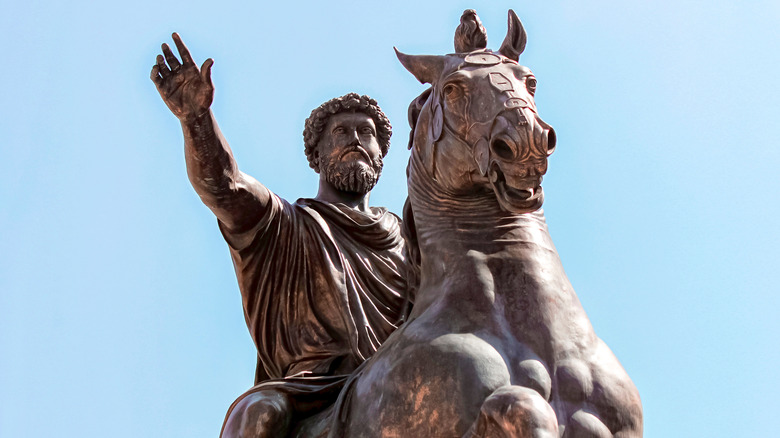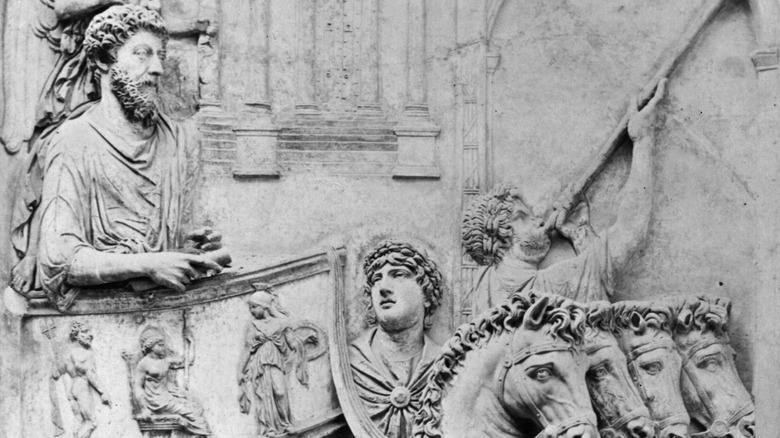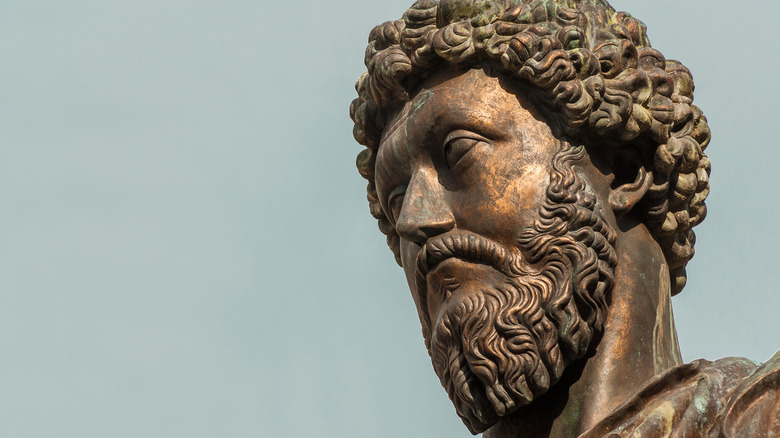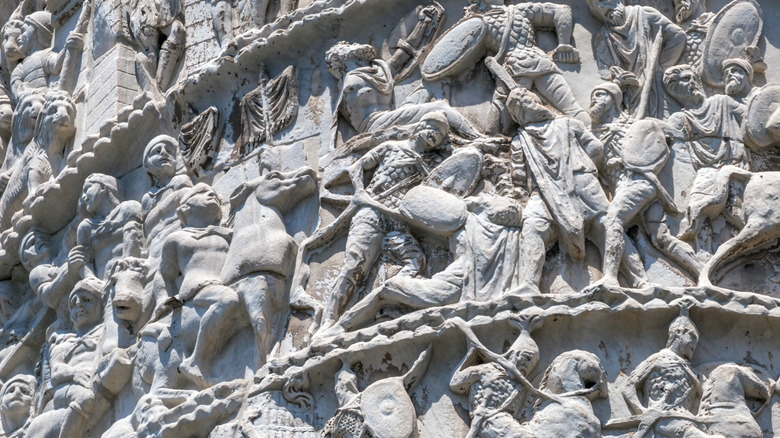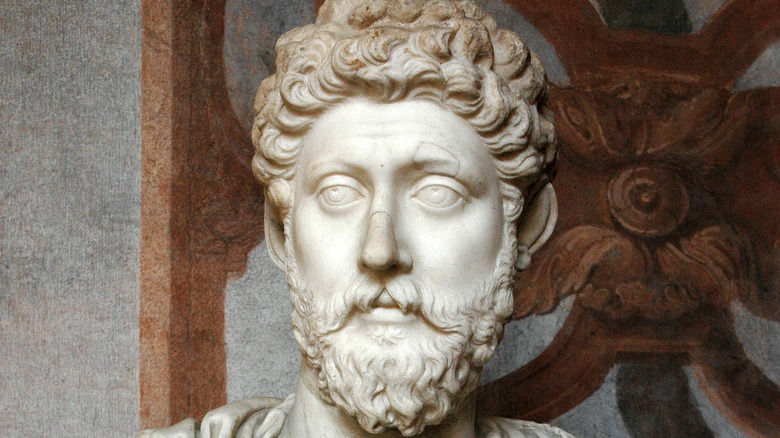Why Is Marcus Aurelius Considered The Wisest Roman Emperor?
It's not too often that we can legitimately associate rulers with anything even approaching "wisdom." Typically, in the modern age, it seems like we've got to scrape the bottom of the "is this really the best we've got?" barrel just to drag up someone who can complete a coherent, teleprompter-aided sentence. And yet, despite each individual person — high or low — being a messy bundle of psychological contradictions, self-deception, and self-destructive inclinations, we somehow still hope that government will be a moral sounding board. So how strange would it be to learn that there was an autocrat, way back in the ancient Roman day, who was truly worthy of the mantle of "leader?" We're talking post-Republic (after 27 B.C.E.), full-on imperial Rome, the last of the "Five Good Emperors" before the whole empire went to pot.
Enter Caesar Marcus Aurelius Antoninus Augustus, commonly known as Marcus Aurelius, who reigned from 161 to 180 C.E. (per World History). Born Marcus Annius Verus in 121 C.E., Aurelius embodied the "Philosopher King" ideal first described by Plato that historians have dubbed Aurelius. Aurelius wasn't one of those historical figures who did some good for society but was secretly monstrous, or who folks once adored but have now come to revile due to changing cultural standards. He was a leader who practiced what he preached to the fullest and worked for the common good of everyone, not because of political machinations or the desire for fame, but because it was right.
Born to rule, and worthy of it
Marcus Aurelius was born in modern-day Spain to a wealthy, politically-connected family, as World History tells us. His father's side came from a line of generational senators, and his mother came from a wealthy family with strong political ties. Aurelius was taught by private tutors in his early childhood, which was the educational norm until very recently (until the mid-19th century in the U.K. and U.S., for example, per Courses UK and the American Board). Aurelius lacked for nothing, and those in power eyed him as a future emperor from the get-go.
Despite such an upbringing, Aurelius was one of those rare individuals who wasn't negatively impacted by wealth and privilege. He didn't transform into a disconnected snob or an emotionally obdurate tyrant, he wasn't obsessed with the hollowness of fame, and he despised all manner of "vain prattling" and "the clacking of tongues" (per The Historian's Hut and Daily Stoic, respectively), as he would later say.
Part of Aurelius' "right-mindedness or nothing" perspective came from his natural disposition, and part of it was the result of his tutors. When Aurelius was in his early teens in 132 C.E., one of his teachers, Diognetus, introduced him to the philosophical works of the Cynics, who emphasized the importance of living a simple and authentic life. Plus, Aurelius' father died when he was young, which allowed him to grow up in the care of his primary teacher, Antoninus Pius, a Stoic philosopher and Rome's preceding emperor.
Philosopher King and Stoic
Historians refer to Marcus Aurelius as a "Stoic," like his mentor, Antoninus Pius. We use the word "stoic" nowadays to mean taciturn or even emotionless, but in its original form, "Stoicism" was a school of philosophy. Stoics emphasized the fleeting nature of life and the interconnectedness of all living creatures (via the Daily Stoic). They believed in a universal "intelligence" that all "social animals" (as Aurelius would later write) shared, no matter how wayward. They believed in the duty of each person to guide the lost into a moral "good life" and to endure hard circumstances with grace to make the power of misery minimal. They also advocated self-reliance, not belief in gods or spirits.
By age 11, as scholar Irwin Edman states on World History, "Marcus Aurelius dedicated himself to religion, for philosophy all his life was with him a kind of religion, the true inward religion that lay behind the rites and ceremonies of the imperial religion which he was careful and content to observe." Aurelius thought much of court life and its daily rituals was empty nonsense and expressed as much in letters. He preferred the "the camp-bed and the cloak" over a lavish lifestyle, and often slept on the floor in his room instead of his bed. He also kept possessions to a minimum and cared about virtue and law more than anything else. In short, he had all the makings of the kind of leader people need but rarely get.
Meditations written to himself
Much of what we know about Marcus Aurelius' character comes not from his tenure as emperor (more on that later) but from his written work, known as "Meditations." "Mediations" isn't an official philosophical "how-to" guidebook or some droll governmental recitation — it's just some journal entries that Aurelius made to himself, likely from 171 to 175 C.E., per the Internet Encyclopedia of Philosophy. He never intended for them to be seen, let alone published, and they weren't even discovered until Italian scholar Angelo Mai stumbled across them in the 19th century. Some of the entries in "Meditations" are dedicated to Aurelius' teachers, and some of them mention where he wrote them. The entire thing, as Stoicism explains, was written in Greek.
It sounds hyperbolic to say that every single sentence in "Meditations" explodes with insight or that the book effortlessly ranks among humanity's chief works of wisdom. By and large, though, such statements are absolutely true. Overall, "Mediations" discusses duties between human beings, the definition of "a good man," the emptiness of praise, the brevity of life, and how to endure suffering.
Among quotes too numerous to list we have, "In man's life, time is but a moment; being, a flux; sense is dim; the material frame corruptible; soul, an eddy of breath; fortune a thing inscrutable, and fame precarious" (via AZ Quotes), and, "Your mind will be like its habitual thoughts; for the soul becomes dyed with the color of its thoughts" (via Goodreads).
Right conduct, duty, and a full life
It's worth relating more quotes from "Meditations," as nothing could explain Aurelius' wisdom better than a few of his own words.
Regarding right conduct, Marcus Aurelius said, "Don't you see the plants, the birds, the ants and spiders and bees going about their individual tasks, putting the world in order, as best they can? And you're not willing to do your job as a human being?" (via Goodreads), and, "Waste no more time arguing what a good man should be. Be one" (via Daily Stoic).
Regarding the opinions of others, he said, "I have often wondered how it is that every man loves himself more than all the rest of men, but yet sets less value on his own opinion of himself than on the opinion of others" (via Mayo Oshin), and, "If you are pained by any external thing, it is not this that disturbs you, but your own judgment about it. And it is in your power to wipe out this judgment now" (via Jon and Missy).
Regarding the need to appreciate life, he said, "Your days are numbered. Use them to throw open the windows of your soul to the sun. If you do not, the sun will soon set, and you with it" (via the Circe Institute), and, "Think of yourself as dead. You have lived your life. Now, take what's left and live it properly. What doesn't transmit light creates its own darkness" (via Mayo Oshin).
Beloved by the people
To get a measure of Marcus Aurelius beyond his writings, we can look to his actual tenure as emperor. Right off the bat, Aurelius refused to be elevated to the post unless his brother, Lucius Verus, became co-emperor with him (via World History). Verus, like Aurelius, had been raised by their mutual mentor, Antoninus Pius.
According to "Historia Augusta" (via World History), Verus had a penchant for absurdly lavish parties, including one bash where he gave away "gold, silver, and gemmed bowls ... golden vases in the shape of perfume boxes ... carriages with silver harnesses," and more. The whole thing cost around $60 million in modern currency. To this, Aurelius "groaned and wept for the fate of the world," per "Daily Life in Ancient Rome." And yet, the emperors worked together to institute programs to help the poor, encourage free speech, the arts, and education, and increase the Roman army's pay. Rome saw its economy flourish, and the people loved their two emperors.
For his part, Aurelius lived the same pared-down life as always. When the Parthian kingdom invaded in the east, Aurelius convinced Verus to go instead of him (some say to curb Verus' parties), and Aurelius stayed behind to work on Roman legislation and court cases. Verus died in 169 C.E., and Aurelius was dragged into ongoing campaigns in Germania. His son, Commodus, was a dismal failure in comparison to his father, but unlike the movie "Gladiator" (2000), he didn't assassinate Aurelius. To the end, Marcus Aurelius remained a philosopher first and stayed as good as his word.
